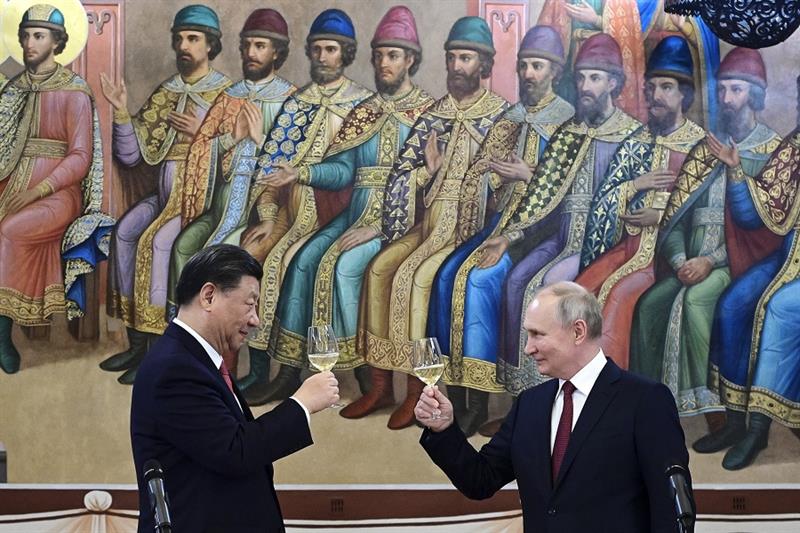China-Russia relations enter a “new era” as Xi and Putin meet in Moscow
Days after Putin received an international arrest order, Xi and Putin sign an accord that solidifies their “no limits” alliance.

The two leaders called for “responsible engagement” to end the Ukraine conflict, while Chinese President Xi Jinping claimed to have signed an agreement with his Russian counterpart Vladimir Putin moving bilateral relations into a “new era” of collaboration.
After their meeting in the Kremlin on Tuesday, Xi said, “We signed a statement on enhancing the strategic partnership and bilateral ties which are entering a new era.”
In order to advance greater “practical cooperation,” he further stated that China and Russia should cooperate more closely.
Putin responded that “all agreements have been reached” and that Moscow and Beijing’s economic cooperation was a “priority” for Russia.
Days after Putin received an arrest warrant from the ICC for crimes committed in the neighboring nation, where Russian forces have made little headway in recent months despite incurring significant losses, the Chinese leader paid a visit to Moscow.
The discussions were meant to solidify the “no limits” alliance the two leaders declared in February of last year, fewer than three weeks before Russia invaded Ukraine.
Beijing “guided by the ideals of the United Nations… and encourage a peaceful conclusion,” the Chinese leader remarked in reference to the situation in Ukraine.
We always support discussion and peace, he continued.
a combined assertion
In a unified declaration, the West was accused of engaging in well-known practices such undermining global stability and invading the Asia-Pacific area with NATO.
Putin stated that a peace settlement might be built on a Chinese proposal to stop the conflict, but that Kyiv and the West were not yet prepared.

We think that many of the proposals made in the Chinese peace plan are in line with Russian ideas and can serve as the foundation for a peaceful resolution when Western nations and Kyiv are prepared for it. But as of yet, we have not observed any such readiness on their part,” stated Putin.
China’s 12-point plan for a de-escalation and eventual cease-fire in Ukraine lacked specifics on how to put an end to the fighting.
Given Beijing’s failure to denounce Russia’s invasion of Ukraine, the United States has dismissed the plan and claimed that a ceasefire would lock in Russian territory gains and give Putin’s troops more time to reorganize. The White House responded to the meeting by claiming that China’s attitude was not impartial and urging Beijing to put pressure on Russia to leave the sovereign territory of Ukraine in order to put an end to the war.
Putin blasted Western nations for battling “to the last Ukrainian” after their meeting with Xi and welcomed the strengthening economic, energy, and political relations between China and Russia.
Xi restated China’s “neutral posture” on Ukraine while praising his “open and friendly” discussions with Putin. He also advocated for communication.
Although saying that Russia must withdraw its soldiers from Ukraine and stressing the significance of Ukraine’s territorial integrity, Kiev had welcomed China’s diplomatic intervention.
Volodymyr Zelenskyy, the president of Ukraine, said on Tuesday that Kiev had urged Beijing to support a Ukrainian peace plan to stop Russia’s war in Ukraine, but that it was still awaiting a response.
Internet and gas
The Power of Siberia 2 pipeline, which would transport 50 billion cubic meters (bcm) of natural gas annually from Russia to China via Mongolia, was also advanced as a result of the deal.

Putin declared that after all agreements on a planned pipeline to transport Russian gas had been reached between Russia, China, and Mongolia, Moscow was prepared to increase oil shipments to Beijing.
The need for the pipeline has grown as Russia looks to displace Europe as its primary gas consumer.
The two leaders also talked about the internet, according to the Russian news agency TASS, and decided that they support multilateral, equal, and transparent regulation of the Internet while opposing the military of information and communication technologies.
According to the agreement, “[they] support the establishment of a multilateral, egalitarian, and transparent global management system of the Internet with the support of sovereignty and security of all countries in this field.” TASS reported this.
“Endless possibilities”
Putin praised the “prosperity” of the Russian and Chinese peoples at a formal supper that took place after the talks.
He asserted that there were “really infinite potential and prospects” for Russian-Chinese collaboration.
When Putin faces battle against what he perceives as a hostile West determined to hand Russia a “strategic defeat,” Xi’s official visit was a huge boost for him.
While Tuesday’s deal was not an alliance, Samuel Ramani, an associate fellow at the Royal United Services Institute (RUSI), told Al Jazeera that it was “quite evident that China and Russia are working on a lot of fronts.” The Japanese prime minister made a rare, unannounced visit to Kyiv at the same time as Xi and Putin’s meeting, underscoring Tokyo’s support for Kyiv in its struggle against Russia’s invasion. Fumio Kishida, whom Zelenskyy referred to as “a very formidable supporter of the world order and a longtime friend of Ukraine,” was welcomed by the Ukrainian leader in video that Zelenskyy share




